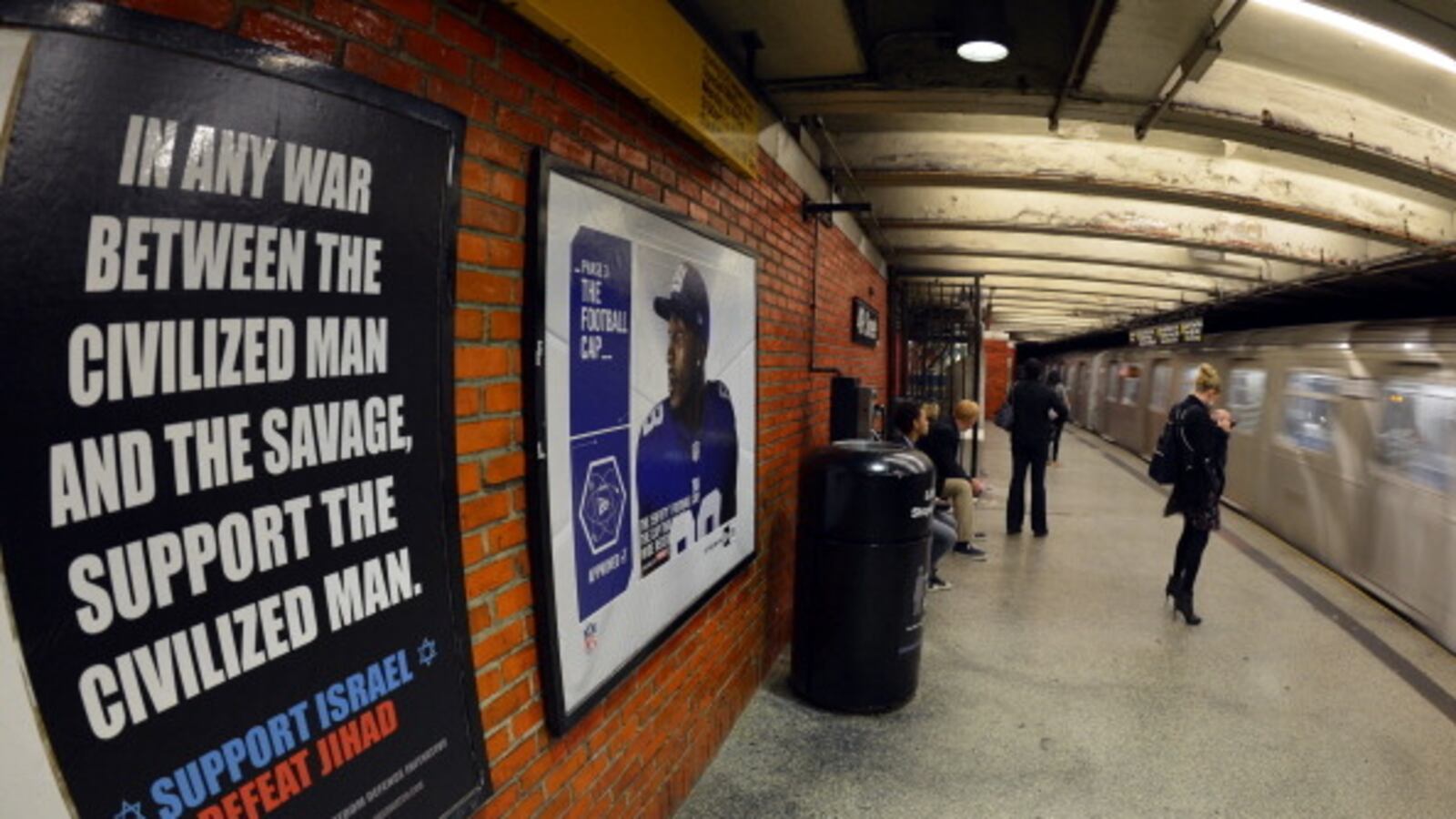“This is not a large campaign that lots of people are going to notice,” a Metropolitan Transit Authority representative said Friday in reference to the anti-Muslim subway ads that would soon be released in New York City. This, it turned out, was very wishful thinking. The ads, which went up Monday, have already generated a flurry of protests, demonstrations and media backlash, much of which has come from the organized American Jewish community.
The American Jewish Committee, the Jewish Community Relations Council and the Anti-Defamation League were among the first organizations to condemn the subway ads. The AJC and JCRC stated in August, “We are steadfast in our support of Israel and our concern about the growing threat of Islamic radicalism, and steadfast in our opposition to anti-Muslim stereotypes.” The ADL called the ads “highly offensive and inflammatory,” but was careful to recognize that they constitute protected political speech under the First Amendment.

It was on the basis of the First Amendment that Pamela Geller of the American Freedom Defense Initiative won her federal case against the MTA, who initially rejected her ad campaign because of its demeaning language. In July, a New York judge ruled to protect Geller’s freedom of speech, forcing the MTA to run the ads for 30 days.
But almost as soon as the ads went up, activists went out and altered them. By Tuesday, stickers bearing the words “racist” and “hate speech” had been slapped across ads in at least five out of ten subway stations.
Many New York subway riders support these alterations. “I don’t support vandalism, and I wouldn’t do it,” said David Jones, 39, from Hamilton Heights. “But if I saw somebody do this, I’d probably say ‘right on!’” Staring at the ad in Times Square station, where someone had blacked out the word “savage,” Jones added that the use of that word was so “inappropriate, bellicose, and disconcerting” that it was making him “incensed.”
An NYU graduate student at the same station agreed, explaining, “The use of a word like ‘savage’ comes with such a huge amount of historical baggage. I’m not just talking about its recent application to Muslim people. I’m talking about the entire history of colonialism.”
In reference to the blacked-out text, she said, “As much as I normally support free speech, in a case like this, I think that manifesting your disapproval should fall under that same category. I don’t see this as some sort of violation of property. I’m actually kind of proud of a city that would not tolerate this type of speech.” While she agreed that altering the ads constituted vandalism, she stated, “It’s the type of vandalism I would never prosecute.”
But not everyone was so approving. “You have to protect freedom of speech, whether it’s positive or negative,” said Steve Guzman, 38, from Connecticut. “A lot of people fought for that right.” According to Guzman, it was wrong for people to vandalize the ads and the vandals should be prosecuted.
Unsurprisingly, MTA personnel working in Times Square agreed with this line of thinking, stating, “All I can say about that is that people shouldn’t vandalize things.”
But not everybody who finds the ads offensive has opted to alter them: some New Yorkers are taking a more creative approach, using their own freedom of speech to counteract Geller’s.
Jews Against Islamophobia, a coalition of three Jewish organizations, responded by encouraging people to make their own subway ads, photograph them, and tweet them using the hashtag #MySubwayAd. The twittersphere promptly filled with thousands of tweets.
Ari Hart, an assistant rabbi at the Modern Orthodox synagogue Hebrew Institute of Riverdale and a founder of the Jewish-Muslim Volunteer Alliance, took to Times Square on Monday with his Muslim friend Anam Farooqui. Together, they stood beside Geller’s ad and held up handmade posters. One said, “Fanatics from my faith do not represent me.” Another quoted from the Yom Kippur liturgy: “For the sins which we have committed before You—by evil speech, desecrating the Divine Name, and hatred—for all these, God, forgive us, atone for us.”
“It was really important to us to not respond with hate and aggression,” Hart explained. Instead, he wanted to react by “spreading love and understanding.” He also wanted to respect the legal decision to protect Geller’s freedom of speech. So, rather than seek to nullify her message, he and Farooqui sought to present a counter-narrative. This counter-narrative quickly caught on: When Hart posted a photo of himself and Farooqui online, within hours, thousands of people liked, shared and commented on it across the world.
“The world is searching for hope and light today, and as Jews, I believe it is our mission to help spread it,” the rabbi said. “It is my hope that all kinds of Jews will speak out against intolerance.”
Unfortunately, not all kinds of Jews have. Amidst the bevy of Jewish leaders lambasting the ads, some have remained conspicuously silent. AIPAC and ZOA haven’t said a word. Neither the Rabbinical Council of America nor the Orthodox Union—two of the world’s largest organizations of Orthodox rabbis—have made a peep. When contacted, an OU spokesman, who wished to remain anonymous, stated, “We have no comment at this time.”






